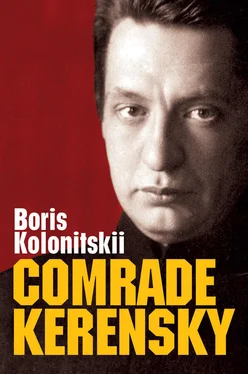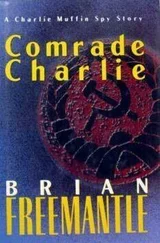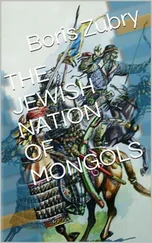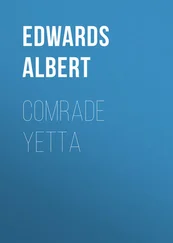In the course of devising autobiographical sources of legitimation in 1917, Kerensky could not avoid the topic of the war, and when it was tactically to his advantage he could even present himself as an internationalist. Addressing the First All-Russia Congress of Soviets on 4 June, he declared, ‘From the very beginning of the war, at the first session of the State Duma on 20 July 1914, we and the Social Democrats in Russia were the first – remember this – the only parties in Europe to vote publicly against military appropriations.’ This claim was greeted with applause. 110Remembering the past in this manner was what that particular audience at that particular moment wanted to hear.
Kerensky publicly condemned chauvinism and criticized all the governments of Europe for unleashing war, but, most importantly, he never omitted to harshly attack the Russian government. He did not exclude the possibility of a civil truce within the country but made it conditional on the introduction of a whole raft of reforms. At other times he was more radical. His Trudovik colleague Vladimir Stankevich, who was close to him, described Kerensky’s position as ‘contributing to the war effort by criticizing the government.’ Kerensky was influenced by the decisions of the Zimmerwald International Socialist Conference held in September 1915, and he would often use the phraseology of the internationalists, even while remaining a defencist who never stopped opposing the government. When it was to his advantage Kerensky would even describe himself as ‘a left-wing Zimmerwaldian’. This was untrue, although some of his contemporaries did believe he was opposed to the war. 111Depending on the situation, seeking to create the widest possible coalition against the government, Kerensky could express different views, adapting what he said to his audience.
At illegal meetings Kerensky found himself under pressure from radically minded Socialist Revolutionaries who were conducting anti-war propaganda, and would use words they would find persuasive. With time, however, his differences with the internationalist wing of the Socialist Revolutionaries became more marked. 112He wanted to create a ‘red’ or ‘left’ bloc uniting all socialists, whatever their attitude to the war. 113In his public speeches he took every opportunity to denounce the government – common ground for all the forces he was trying to bring together.
Together with Nikolai Sokolov, Kerensky organized the legal defence of five Bolshevik deputies of the Duma who had been arrested in November 1914. From the tribune of the Duma he protested against the arrest of ‘our comrades’ and headed a group of radical lawyers who defended these Social Democrats in court. He continued subsequently to demand the release of ‘the five’. 114The celebrated memoirist Nikolai Sukhanov, a Menshevik internationalist, recalled that Kerensky behaved like a professional revolutionary. He used his trips around the country as a Duma deputy for illegal work, delivering public lectures, helping to organize opposition, supporting it with funds provided by his liberal friends. This was not something which could remain unnoticed. The right-wing politician Nikolai Tikhmenev wrote: ‘The revolutionaries’ leaders, the likes of Kerensky, are busily travelling round Russia delivering talks and lectures, and in the meantime evidently arranging a bit of this and a bit of that. Financed by murky sources, new social-democratic newspapers are popping up like bubbles out of the mud in provincial towns. The insolence of the “progressive” press is on the increase.’ 115Kerensky’s opponents in the Duma may have exaggerated the scope and results of his activities, but his renown was increasing all the time. His connections with those in the underground, and his reputation as someone with those links, were of importance to him during the events of February 1917.
Kerensky, as we have noted, did not confine his illegal activity only to supporting Socialist Revolutionaries. Meetings aimed at bringing about unity among the left-wing organizations took place in his own apartment. On 16–17 July 1915 a conference of representatives of the Narodnik groups of Petrograd (as St Petersburg had been renamed at the outbreak of war), Moscow and the provinces was held there. The police considered Kerensky to be the prime mover of this meeting, at which a central bureau was established to coordinate the activities of the Trudoviks, the People’s Socialists and the Socialist Revolutionaries. Disagreements on the issue of the war, together with police harassment, prevented the union from becoming a reality. Meetings of the capital’s Socialist Revolutionaries also took place in Kerensky’s apartment, as the secret police were well aware. In July 1915, police posts on the Russo-Finnish border received a secret order advising them that Kerensky was travelling around the empire, ‘engaging in anti-government activity’. They were instructed to keep him under observation. After the revolution this document was put up at Beloostrov railway station at the Finnish border for the public to see, as publications supportive of Kerensky duly reported. 116
The police exaggerated the role of the Trudovik leader in organizing protest. A report from the director of the Police Department linked the strikes of summer 1915 to Kerensky’s propaganda activity, claiming he had called for the establishment of factory collectives to form soviets along the lines of those which had appeared in 1905. In the report Kerensky was named as ‘the principal leader of the current revolutionary movement’. In reality, Kerensky and Chkheidze had urged the workers not to waste their energy on individual strikes but to prepare for future decisive action against the regime. After February 1917, police assessments of this kind, even if factually erroneous, were all to the good of the reputation of the champion of freedom. Newspapers published such documents, provided by Kerensky’s supporters who had the archives under their control. His biographers readily quoted from them. 117
Kerensky’s wartime experience was important training for the politician. He tried persistently, if not always successfully, to reconcile fundamentally different political forces in order to enable them the better to fight their common enemy, the existing regime. He kept his position on the most controversial issue – his attitude towards the war – unclear, and at times in front of different audiences described it in different ways or with different emphases. It would, nevertheless, be a mistake to classify Kerensky as a centrist. His behaviour was more a matter of pragmatic ideological flexibility, sincere if bordering on opportunism. This ambiguity prevented him from becoming the leader of any one party, but it also meant he was welcome in very diverse circles, which was crucial for someone attempting to broker interparty agreements and who saw his mission as being to build a broad coalition of oppositionists.
It is not easy to assess Kerensky’s actual contribution to organizing the underground. Michael Melancon, a historian of the Socialist Revolutionary Party, believes the clandestine revolutionaries used Kerensky and the resources he controlled but rejected him as a leader. 118
Other illegals also discussed relations with Kerensky, whose influence was on the increase. Revolutionaries were no doubt also attracted by the money at his disposal. Alexander Shlyapnikov seems to have raised the question of possibly making use of these resources with Vladimir Lenin. In his reply in September 1915, the Bolshevik leader characterized Kerensky as a ‘revolutionary chauvinist’ with whom it was impossible to enter into any alliance but with whom there could be cooperation in technical matters. Lenin’s letter can be interpreted both as a recommendation to make use of Kerensky’s resources and as a call for joint action to achieve the destruction of the regime. ‘Our relations should be direct and clear: you want to overthrow tsarism to gain a victory over Germany, while we are working for the international revolution of the proletariat.’ 119As we see, the possibilities for a broad front of the forces of the opposition which Kerensky was trying to create could have included the Bolsheviks. The experience of negotiations during the war, even those which were unsuccessful, did influence the behaviour of its members during the February Days and what they had to say about each other. The initial restraint shown by some of the Bolsheviks in their criticism of Kerensky may have gone back to joint initiatives in the years before the revolution.
Читать дальше









